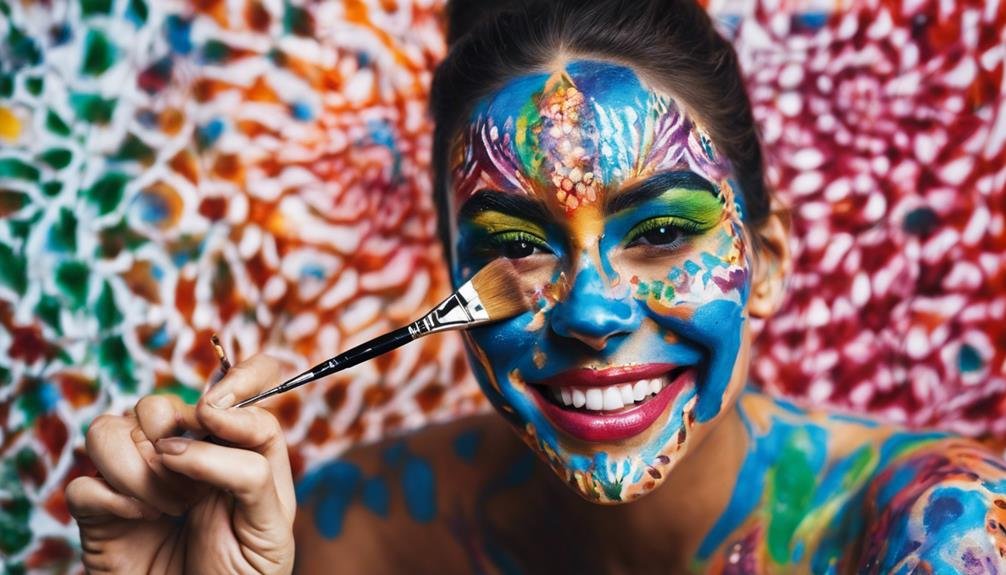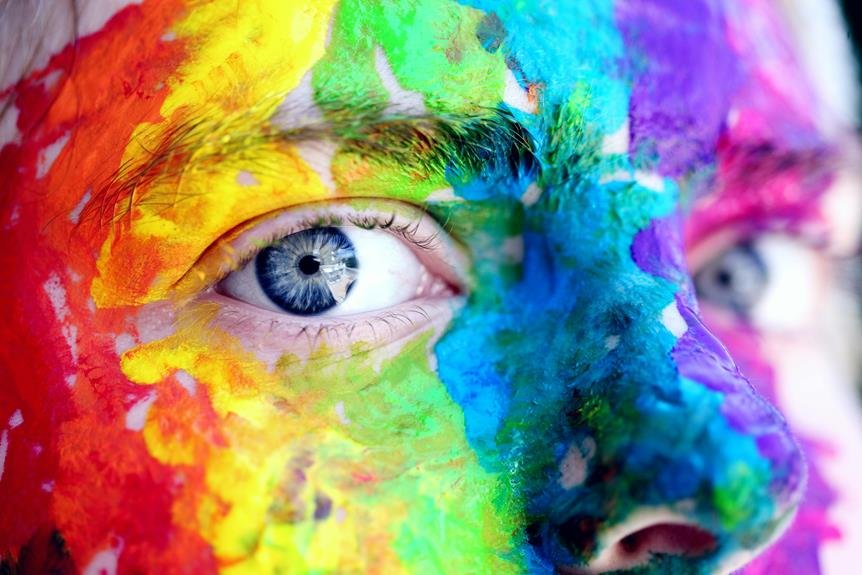Putting paint on your face can be risky. Allergic reactions from unsafe ingredients and skin sensitivity are possible. Legal troubles might also arise. Stick to FDA-approved cosmetic products for safety. Harmful chemicals in paint can cause redness, itching, or rashes. Test skin for reactions before full application. Opt for skin-friendly, non-toxic face paints. Cleanse your face gently with soap and water after. Choosing reputable brands like Fusion Body Art or Superstar is wise. Prioritize skin safety always. Additional insights can provide more understanding on face paint risks and precautions.
Key Takeaways
- Risk of allergic reactions from banned ingredients.
- Acrylic paints not recommended for skin use.
- Opt for FDA-approved cosmetic face paints.
- Prolonged use can lead to skin issues like acne.
- Choose skin-safe options like Fusion Body Art or Global Colours.
Risks of Using Non-Skin-Safe Paint
Using non-skin-safe paints on your face can lead to allergic reactions and skin sensitivity due to banned ingredients present in these products. To avoid skin allergies and potential legal implications, it's vital to take precautions when selecting products for face painting.
Manufacturers like Liquitex and Apple Barrel explicitly advise against using acrylic paints on the skin due to the health risks involved. Legal consequences, such as lawsuits and financial losses, can arise from skin irritation caused by these non-skin-safe paints.
Prioritizing safety by opting for FDA-approved cosmetic products specifically designed for skin use is essential to steer clear of the risks associated with banned ingredients in certain paints. By adhering to safety guidelines and choosing products that are skin-friendly, you can prevent skin allergies and protect yourself from any legal troubles that may stem from using non-skin-safe paints.
Potential Skin Reactions to Paint
Harmful chemicals in certain paints can trigger skin reactions such as redness, itching, or rashes. Skin care is essential when it comes to using paint on your face.
Some makeup safety tips to prevent skin reactions include checking the ingredients of the paint to avoid known allergens, conducting a patch test on a small area of skin before full application, and removing the paint promptly after use to reduce prolonged exposure.
Keep in mind that skin reactions to paint can vary from person to person, depending on individual sensitivities and the specific components of the paint. Allergic reactions can range from mild irritation to more severe symptoms like swelling or blistering.
To minimize the risk of skin sensitivities or allergies, opt for skin-safe, non-toxic face paints specifically formulated for cosmetic use. Prioritizing skin safety and proper makeup practices can help you enjoy painting your face without experiencing unwanted skin reactions.
Health Concerns With Face Paint

When contemplating the use of face paint, it's important to be mindful of potential health concerns that may arise. Skin care is a vital aspect to take into account when using face paint. Prolonged use of face paint can clog skin pores, leading to acne and blemishes. Additionally, over 50% of face paints contain harmful ingredients that have been linked to various health issues, making it essential to prioritize your skin's health.
Allergic reactions are another significant health concern associated with face paint. There have been reported cases of severe rashes and allergic reactions caused by face paint at events. To mitigate this risk, it's advisable to test a small patch of face paint on your forearm, especially if you have sensitive skin, before applying it to your face. Using face paint from unknown or unverified sources can also pose risks to your skin health and safety. Being cautious about the products you use on your skin is vital for maintaining healthy and safe face painting practices.
Tips for Safe Face Painting
For safe face painting practices, always prioritize using FDA-approved cosmetic-grade face paints on your skin to prevent adverse reactions. Conduct a patch test before full-face application to check for face paint sensitivity or allergies. Opt for skin-friendly options to minimize the risk of skin irritation.
When removing face paint, use gentle soap and water to prevent breakouts. Avoid leaving face paint on overnight as it can clog pores and lead to skin issues. Properly store your face paints and regularly check expiration dates to make sure they're safe for skin application.
Choosing Skin-Safe Face Paints

To guarantee the safety of your skin during face painting, it's essential to choose skin-safe face paints designed specifically for cosmetic use on the face and body. When selecting face paints, opt for brands like Fusion Body Art, Superstar, or Global Colours Body Art, as they offer vibrant colors and safe application.
Unlike non-cosmetic paints such as acrylics, which can contain harmful pigments and harsh base ingredients unsuitable for skin, these skin-friendly pigments are formulated to be gentle on your skin. It's advisable to test a small patch of paint on your forearm, especially if you have sensitive skin, before applying it to your face.
For beginners, water-activated face paints are recommended due to their ease of use and removal. By choosing the right face paint alternatives with skin-friendly pigments, you can enjoy a safe and enjoyable face painting experience.
Proper Face Paint Removal Techniques
After a fun day of face painting, ensure your skin stays healthy by using proper face paint removal techniques. To guarantee gentle removal, start by using mild soap and warm water to cleanse your skin thoroughly. This will help eliminate any leftover paint without causing irritation.
For delicate areas like the eyes and lips, consider using high-quality baby wipes, as they're effective at removing face paint without being too harsh on your skin.
If you prefer a more natural approach, olive oil can also work wonders in gently taking off face paint without the use of harsh chemicals.
Importance of Skin Safety in Face Painting

Ensuring skin safety is paramount when it comes to face painting, as using inappropriate paints can result in various skin issues and discomfort. Skin sensitivity is a pivotal factor to contemplate before applying any face paint. Makeup-grade body paints are formulated to be skin-friendly alternatives, reducing the risk of irritation and discomfort. These paints are specifically designed for use on the face, offering benefits such as vibrant colors and easy application while prioritizing skin safety.
When dealing with face paint, it's crucial to take necessary precautions to prevent adverse reactions. Non-cosmetic grade paints often contain harmful pigments and harsh base ingredients that can lead to skin issues. Acrylic paints, for example, can dry stiff, limit skin flexibility, crack easily, and be painful to remove when used on the face. Opting for face paints that are made for the skin can help avoid these problems and ensure a more enjoyable face painting experience. Always prioritize your skin's well-being when choosing face paint products.
Frequently Asked Questions
Is Paint Good to Put on Your Face?
Putting paint on your face can be harmful. Prioritize skin safety by using makeup alternatives like face paint, which are formulated to be safe and gentle. Avoid using non-body paints as they may contain toxic ingredients.
Is It Bad if I Get Paint on My Skin?
Getting paint on your skin can be bad if it's not skin-safe. Choose body paints for skin safety. To avoid discomfort and irritation, opt for safe options. Remember to remove paint gently to keep your skin healthy and free from long-term issues.
Can Paint Affect Your Skin?
Paint can affect your skin by causing reactions and long-term effects. Be cautious of potential allergies; take safety precautions. Choose skin-safe body paints to avoid irritation. Prioritize your skin's health when using paint.
Can We Use Painting Colour on Face?
When it comes to face painting, safety is key. Always prioritize skin care by choosing safe, skin-friendly paints specifically made for the face. Remember, using non-body paints like acrylics on your face can lead to discomfort and skin reactions.
Conclusion
To guarantee your safety, it isn't advisable to put regular paint on your face as it can lead to skin irritations, allergic reactions, and other health concerns.
To prioritize your safety, always use skin-safe face paints specifically designed for use on the skin. Remember to follow proper face painting techniques and remove the paint gently to prevent any potential skin damage.
Prioritizing skin safety is crucial when it comes to enjoying face painting without risking any harm.
